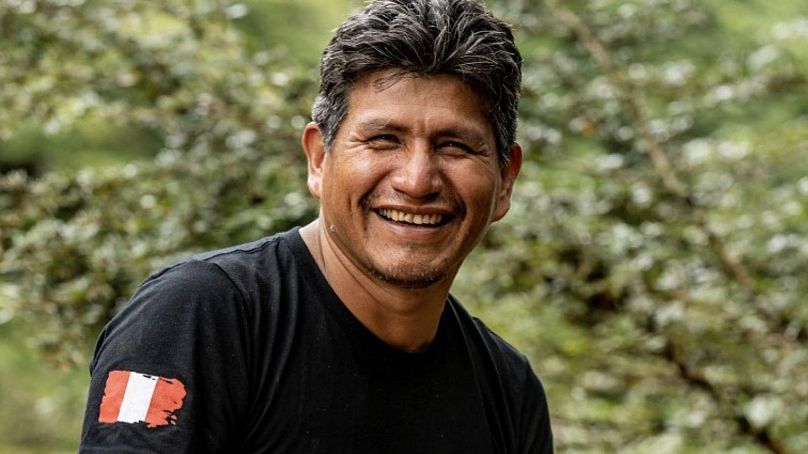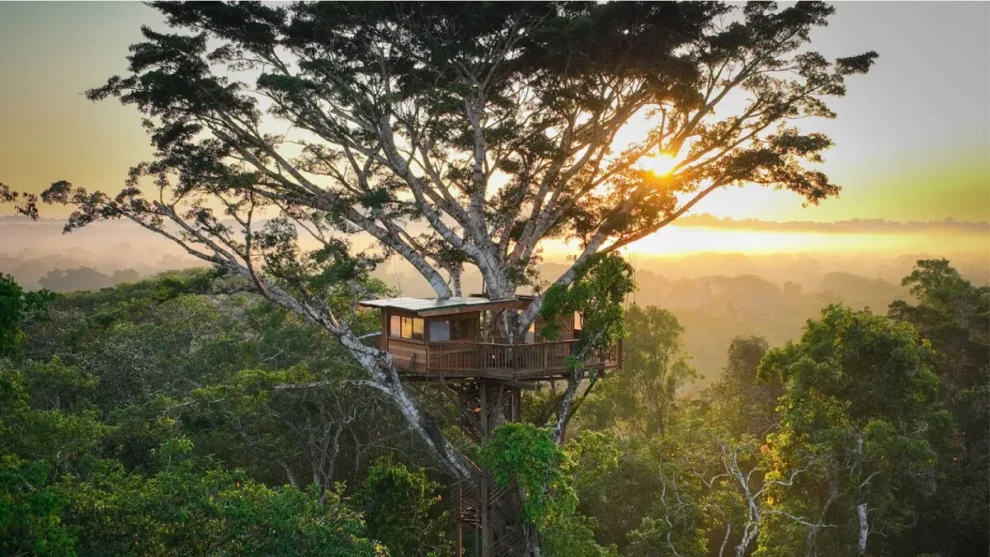Education is changing the lives of Indigenous Peruvians in the Amazon.
From a classroom in the Amazon’s tallest treehouse, young Peruvians are learning how to defend their rainforest home.
Nestled in the crown of a strangler fig tree, the rangers have a bird’s eye view over the canopy.
It’s an education in itself, says Juan Julio (JJ) Durand, vice president of Junglekeepers – a nonprofit which conserves threatened habitat in the Madre de Dios (Mother of God) region of Peru’s Amazon.
“Not only does it look beautiful, but [the students] can also see how much biodiversity there is from the top of the treehouse,” says JJ, who is part of the nearby Ese-Eja Indigenous community of Infierno on the Tambopata River.
“How many animals, monkeys, birds – how many living animals moving around, and how much effort is needed to protect them.”
At 48 years old, he’s still learning about his astonishingly rich home – and the treehouse feeds this curiosity. At 32 metres up, there’s always something new to see and learn about, he says.
From logger to rainforest defender
On his mission to educate Indigenous communities and incentivise them to protect the Amazon, JJ has a well of personal experience to draw on.
Just before his last year of secondary school in Puerto Maldonado city, he was conscripted into the army, finishing his studies at night.
Afterwards it took a while to adjust to civilian life back on his family’s small farm, where they harvested bananas, corn, rice and other crops for subsistence. Money was made through his father’s work in mining and logging – activities that the young JJ was reluctant to follow him in.
He quickly made the choice to work at a tourist lodge instead. And, while working as a guide, his own appreciation for nature grew – alongside his desire to learn more.

In Peru, school dropout rates are a significant issue. According to Junglekeeper’s research, 12 per cent of children leave school before age 13, and 17 per cent do not finish secondary school.
JJ understands the generational pull of extractive activities – and the allure of illegal logging, which the charity says has not abated in Peru’s southeast.
At Junglekeepers, JJ helped oversee the construction of the towering treehouse, guiding the multinational crew with his local expertise. It provides an exceptional lookout over the almost 222 square kilometres that the rangers patrol and safeguard.
In the dry season, they’re not only witness to the Madre de Dios’s diverse aerial life, but can spot where fires start.
How do the rangers help protect the Amazon?
Rangers patrol everyday in different directions, says JJ, equipped with high-tech tools. These include communication devices, drones to capture – but stay a safe distance from – illegal activity, and one particularly special gadget: a solar-powered, seed planting robot.
Indigenous community members are taught how to work with these and other bits of tech to maintain trails, report illegal activity, and track wildlife to contribute to scientific datasets.
In the treehouse classroom, the rangers are also taught how to diffuse some tricky situations.
Poaching starts with one or two people, JJ explains, before word spreads down the rivers.
“The worst thing is people from outside Madre de Dios, because they are not the jungle people. They are from the Andes,” he says. “And that’s worse because when the Andes people come, they don’t know how to behave in the rainforest.”
While local communities use arrows, bows and machetes to hunt, “invaders”, as JJ calls them, come with big chainsaws and Western tools that are unsustainably destructive.
“When we have to deal with the people from outside Puerto, that’s a challenge. That’s very hard. So we need to have another skill – to talk to them: to approach the problem and see how we can fix it.”
Education is key, JJ believes. To that end, Junglekeepers has partnered with online learning platform Udemy to provide “hundreds of thousands” of courses to Indigenous adults in the region.
In its dual role as a learning hub and tourist destination (available from $1,500 or €1,375 a night) the treehouse also offers a range of employment opportunities.
Source: Euronews.green











